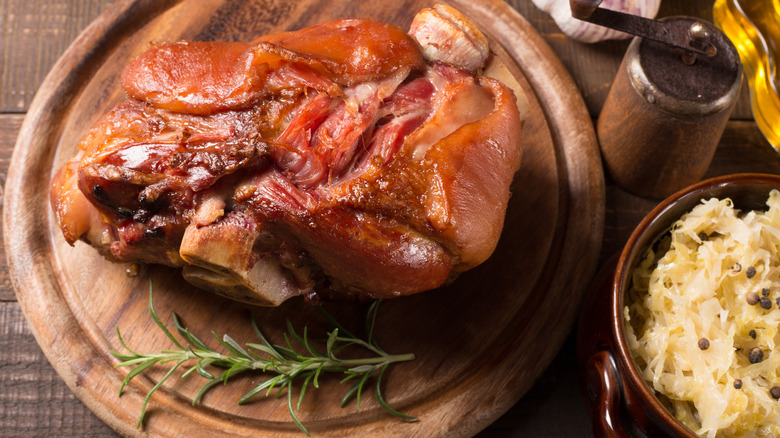The Symbolic Tradition Of Eating Pork On New Year's
Food is a central part of holiday celebrations, and depending on where you grew up, you probably enjoy certain traditional meals. In some parts of the United States, it is a common tradition to eat pork and sauerkraut on New Year's Day. But this dish isn't just a tasty combination of salty meat and fermented cabbage — it's a symbolic tradition that dates back to Germany hundreds of years ago.
In rural Germany and other parts of Eastern Europe, peasants raised pigs and slaughtered them in the fall so the meat could be butchered and safely stored during the cold months. After the autumn slaughter, families would select choice cuts of pork to be kept for their New Year's celebration. But pork wasn't just a convenient cut of meat; it also symbolized good luck in the coming year. This is because pigs, unlike chickens or turkeys, root forward as they eat, representing forward progress and luck for the new year, according to the Carnegie Museum of Natural History.
"It's good to always go forward into the next year — you don't want to go backward," Linda Pelaccio, culinary historian and host of "A Taste of the Past" podcast, explained to Reader's Digest. The tradition also works the other way. "We would not eat lobster for luck in the new year because lobsters walk backward," she added.
Pork symbolizes good luck, progress, and prosperity in the new year
When German settlers moved to America in the 17th and 18th centuries, the New Year's feast tradition came with them, according to Wild Brine. That is why today, parts of the Midwest with high populations of German heritage, such as Ohio, West Virginia, and Pennsylvania, maintain this ritual.
Pork is perfectly paired with sauerkraut, another famous German food harvested in the autumn, making it an ideal vegetable to pickle, ferment, and preserve in time for New Year's Day. Sauerkraut is full of health benefits, according to Wild Brine, and some people believe that starting the new year with the fermented dish also brings luck and longevity, thanks to its long green shreds of cabbage, which represent cash and long life (via Reader's Digest). Pork also tends to be fatty, which is a good thing when it comes to New Year's traditions. While your New Year's resolution may be to lay off fatty foods, traditionally, fat symbolizes prosperity and luck in the coming year. So if you want to thrive in the new year, you might want to begin your New Year's resolution on January 2 instead.

